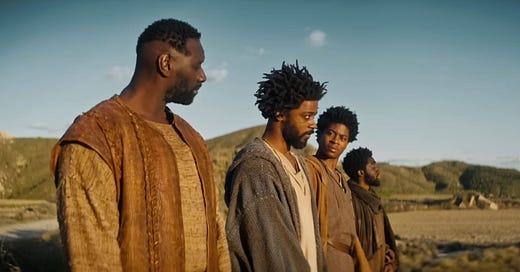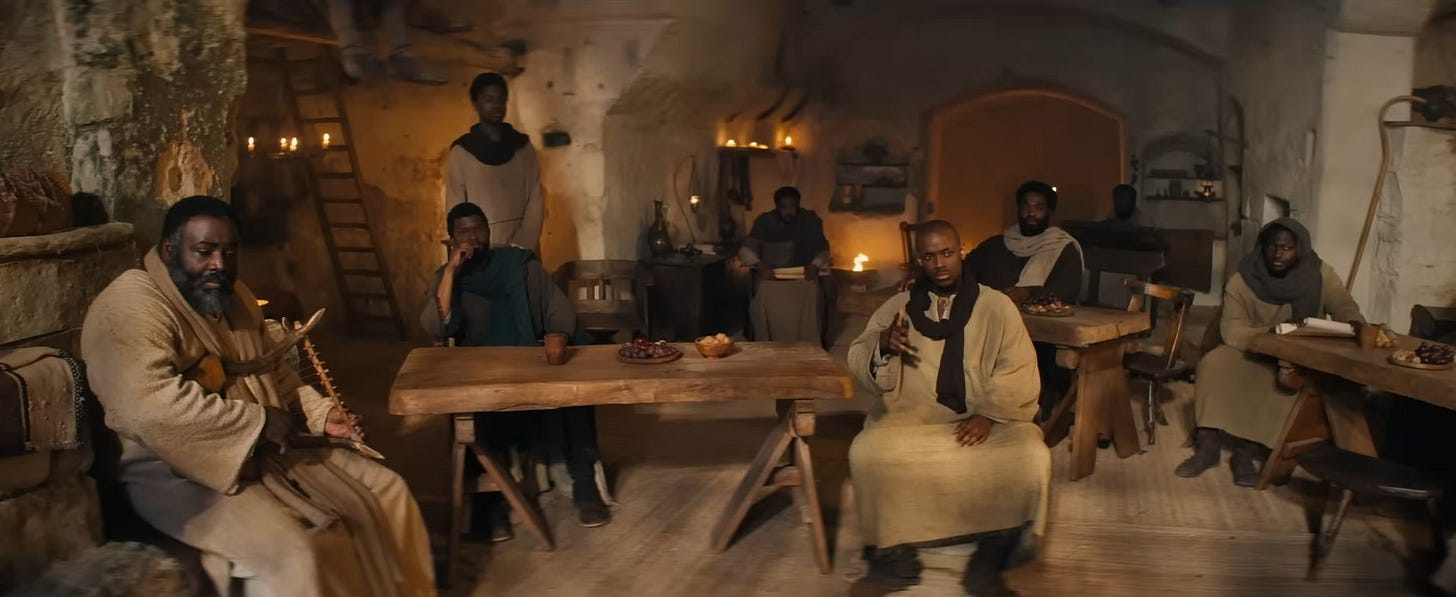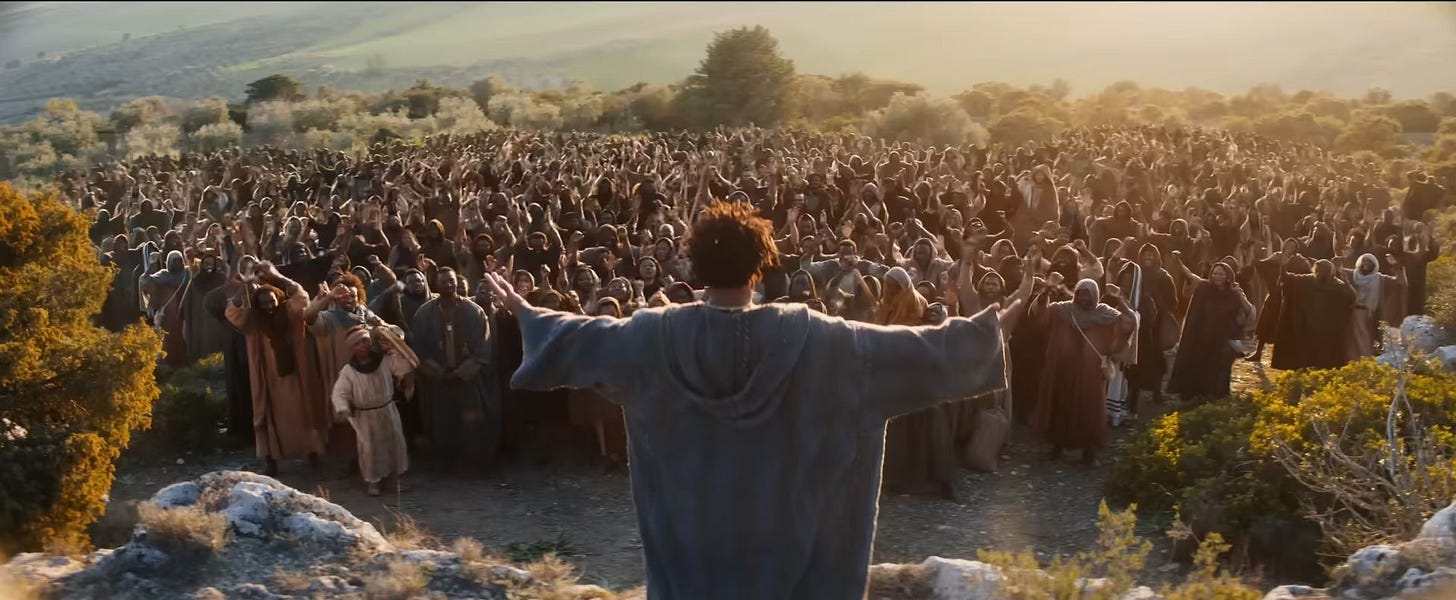'Book of Clarence' Review: Will the Real Messiah Please Stand Up?
In the public library world there is a metaphor called ‘mirrors and windows’ that librarians sometimes use to explain how books are chosen for the collection. A mirror is something that reflects the reader’s own experience or interests. A window provides insight into the experiences or interests of someone else. Book of Clarence falls firmly into the window category for me. As a white, middle-class, agnostic woman I’m sure there are nuances to this film that passed me by. It’s a wildly uneven movie, but it’s so jam packed with earnest and creative ideas I can’t help but recommend it for those who have the patience for the long set up before the emotional wallop of the third act.
Coincidentally there’s another movie out, American Fiction, which also explores the Black experience but from the perspective of an affluent, well-educated author who struggles to bring his life experiences together into one coherent identity. In the process he learns to accept the identities of others even if he is uncomfortable with them. He also reconciles himself to the fact that some parts of a person’s identity are either not a choice or are so entrenched that it would be unreasonable to expect them to change. Compared to Clarence it’s a funnier and more polished film, but they are interesting to see side-by-side as two different perspectives on Black identity and masculinity.
Book of Clarence is written, directed, and scored by British filmmaker Jeymes Samuel, also known by his stage name, The Bullitts. Samuel’s concept was to create a Hollywood-era Biblical epic for the Black community. Jesus, his disciples, and almost everyone else except the Romans are played by black actors- a scenario that is probably closer to historical truth than the mostly white casting seen in Charlton Heston style Biblical films. The more I think and read about this film, the better I like it for what Samuel was trying to achieve. If you want to know what you are getting into with Clarence, and don’t mind a few spoilers, I recommend this piece from NPR where Samuel discusses what he wants viewers to come away with after seeing his film https://www.npr.org/2024/01/14/1224674045/director-jeymes-samuel-on-book-of-clarence-a-biblical-epic-through-a-black-lens.
The titular Clarence, and his twin brother Thomas, are played by LaKeith Stanfield who does an excellent job conveying how Clarence’s outward appearance as an impulsive schemer is a front for his anger towards his devout brother, an uncaring God, and himself. Clarence’s constant refrain is that knowledge is stronger than belief. Clarence knows that he is worthy of love and respect even if everyone else believes that he isn’t. The irony, and the arc along which Clarence’s character develops, is that even though he claims to know that he is worthy, he doesn’t actually believe it. As it turns out, the believing is the important part.
Lots of reviewers mention Life of Brian when talking about this movie, but Clarence is only occasionally funny, and according to the director himself, is not a satire at all. Samuel’s film is deeply spiritual and tries to demonstrate the role that faith can play for an oppressed person, and more broadly, an oppressed people. As someone who grew up going to church, but no longer has a personal relationship to any religion, I found it interesting to see this idea explored in a stylish way that also seems very genuine.
The slow turning of Clarence’s character towards purpose and, yes, faith is the main reason to see this movie. The film is explicitly divided up into three “books” and unfortunately the first two drag quite a bit as Clarence careens off on a series of side quests trying to raise money to pay off his debts to a dangerous local thug. The director was clearly trying to provide opportunities for character development, but not all of it is productive. Samuel is a talented writer who would benefit from a partner to keep him focused. He does a commendable job of balancing the historical setting with just the right amount of anachronisms and magical realism to keep things interesting but not jarring. He also knows how to build a character and doesn’t let his clear reverence for Christian philosophy get in the way of showing that the disciples were only human. However, Samuel wants so badly to include every idea he has on the subject of Christianity, social justice, and personal identity that it all gets a bit muddled. A good example is Benedict Cumberbatch’s cameo appearance. I won’t spoil it except to say that while it is very funny, it doesn’t strictly fit the theme of the rest of the film and could have easily been cut.
In the first two acts, Clarence cynically attempts to join the disciplines as a way to protect himself. He even frees an enslaved gladiator in the process (a very entertaining Omar Sy), but the disciples see through his scheme and reject him. He eventually sets himself up as an alternative bogus messiah mostly to make money, but also so that he can show up Jesus and his disciples who he believes are just more effective scam artists. Unfortunately for Clarence, being a messiah goes along with unwanted attention from the Roman authorities. This third act is where Samuel elevates Book of Clarence to the level of a Biblical epic, and there are moments where Clarence’s story and stories from the Bible collide in such a way that you really feel the wonder of those stories. In particular, there is a walking on water scene that is just spectacular. There is a sharp tonal shift here that is not conveyed in the previews, but it makes sense if you’ve been focusing on the main plot which is the radical transformation of a broken man.
Book of Clarence will move you if you allow it to; however, if you go in expecting it to be primarily a comedy you will be disappointed. Clarence ultimately learns to see God in everyone, including himself, which is not a bad way to look at the world. Just substitute “good” for “God” and the message becomes universal. As he explains in the NPR interview, Samuel would like viewers to appreciate the magic in moments where we are greater than we think we are. This movie is worthy in much the same way that Clarence is; it has loads of potential and moments of greatness, despite wandering from the path of a must-see movie.






